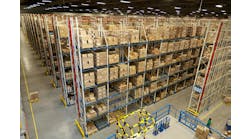Even if you haven't been paying very close attention to material handling equipment news releases, you might be tempted to believe that radio-frequency identification (RFID) readers and encoders are becoming a fairly standard accessory—rather like the way GPS systems are showing up as a standard options for automobiles.
At material handling shows last year, packaging, conveyor, palletizer and other equipment manufacturers began showing equipment that had RFID bolted onto their standard products. And, in the past month alone, two different companies announced pallet stretch wrappers with RFID readers.
And in a somewhat splashy announcement, two companies announced collaboration on a project to develop the "RFID-enabled lift truck of the future" that will use the frame of the lift truck as part of the RFID antenna (as opposed to the current bolt-on readers).
This is all great news, right?
Absolutely. As long as you know what you're doing.
Wouldn't it be really nice to have a trustworthy GPS system to plot your course through your RFID implementation? Of course, there's no such thing. Today you probably need to hire a "local guide" to help you with implementation. But how do you know whether your guide really knows the "lay of the land"?
RFID implementation is still a long way from plug-and-play. There are all of the issues with an RF site survey, reader setup, tuning the antenna (if multiple readers are in the same area), communicating with the host (to either read or write data), determining when a read is a business event and when it's not, developing database fields for EPC or other RFID label data, and even selecting the right tags for a particular product type or packaging level.
The good news is that when you start looking for a "local guide" in the future, you'll have a way to know who can lead you where you need to go.
CompTIA, the Computing Technology Industry Association, will soon launch the Comp-TIA RFID+ certification (www.comptia.org/ certification/rfid). CompTIA already offers a number of IT certifications. Its certifications are recognized internationally as an indication of professional competency.
RFID+ certification will require the successful completion of a test that covers the installation, configuration and maintenance of RFID hardware and device software. Knowledge areas include interrogation zone basics, testing and troubleshooting, standards and regulations, tag knowledge, design selection, installation, site analysis, RF physics and RFID peripherals. The vendor-neutral test, developed by CompTIA and experts representing leading vendors, integrators, suppliers, training companies and the AIDC industry trade association, AIM Global, is intended for individuals with 9 to 24 months of hands-on experience in implementing RFID or related systems.
While the test won't be available until later this year, training programs and study materials, some recognized by CompTIA and some not, are already being offered. If you are considering a training program, check that it has been recognized as a CompTIA Authorized Qualified Curriculum (CAQC).
If you're more interested in finding valueadded resellers and integrators who are qualified to implement RFID, you will soon be able to ask them how many of their employees have CompTIA RFID+ professional status—or have at least successfully completed an accredited training program. Then ask if that individual (or those individuals) will be working on your implementation.
Questioning a vendor about certification and training offers two immediate benefits. First, it demonstrates your knowledge of the current state of affairs in RFID (which might add a nice little bit of intimidation on your part). Second, it will help prompt vendors to get their people certified which, in the long term, will benefit you when they come to install your system.
It's as close to having a GPS to guide you through RFID implementation as you can get.


